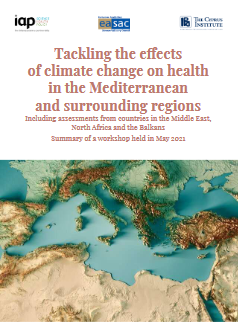There is increasing evidence of adverse effects of climate change on health worldwide, both direct effects and indirect effects mediated by disruption in ecological and socio-economic systems. The increasing awareness of health issues brings new requests by decision-makers for robust evidence to inform policy for climate change adaptation and mitigation solutions.
The Mediterranean region is a “hotspot” and the effects of climate change are greater here than in some other regions. But there is also less information currently available to quantify the effects, understand attribution and implement solutions in this region by comparison with some others.
This report is an output of a workshop organised by the European Academies’ Science Advisory Council (EASAC) in partnership with the InterAcademy Partnership (IAP) and the Cyprus Institute, to assess the science base and evaluate options for protecting and promoting human health in the face of climate change in the wider Mediterranean region (that is, countries bordering the Mediterranean Sea and their neighbours). The workshop was designed to inform three current scientific initiatives:
- Provide additional country perspectives to the Cyprus Government-led Eastern Mediterranean/ Middle East Climate Change Initiative (EMME-CCI).
- Extend work by EASAC to advise on how science can inform policy on climate change and health in the European Union (EU), with reference both to EU policies for its neighbourhood and to its domestic priorities.
- Contribute to the IAP global project on climate change and health, in particular by providing additional country perspectives from North Africa and the Middle East.
A day of diverse inputs and discussions resulted in the following key conclusions:
Of course, the wider Mediterranean is not a homogenous region and there is considerable diversity in geography, socio-economic status, and health systems, as well as in scientific infrastructure, research capabilities, and the degree to which research outputs are used to guide policy and practice. Nonetheless, as workshop participants discussed, there are also commonalities across the region: in the challenges to health posed by climate change, in the need to develop resilient and equitable health systems, and to address fragmentation of research systems. Science is a global public good and there are unprecedented opportunities to capitalise on scientific advances worldwide to develop the solutions, adapted to local contexts, for all regions.
Workshop contributors emphasised the importance for the region in developing collaborations between scientific disciplines and countries in research and data collection, sharing infrastructure, skills and methodologies, in order to fill knowledge gaps, avoid wasteful duplication of research effort, and build trust in responsible science with other stakeholders.
However, it is important to emphasise that the scientific community must work together not only to generate new knowledge but also to advise how to use the knowledge that is already available, as a resource for innovation, to guide practice and inform public policy options.
In this context, in addition to integrating scientific activity between disciplines and countries in the region, there must also be integration in the use of the scientific evidence for policy across sectors. Health issues are relevant to the formulation of policy in many sectors beyond the formal responsibility of health sector policy-makers.
This coordination of effort is essential to understand trade-offs, avoid inadvertent consequences and capture synergies for diverse policy actions. Although the primary focus of the workshop resonated with the scope of the Health Task Force of the EMME-CCI, the parallel activities of other Task Forces in the initiative are of great value in facilitating inter-sectoral action and policy convergence.
Policy decisions depend on more than scientific evidence and must also take into account, for example, societal attitudes towards risk and other social values. There is significant variation in attitudes and values across the Mediterranean region: national academies of science are well placed to help policy-makers understand diversity so that the regional emphasis in policy can be science-based and economically and socially feasible.


